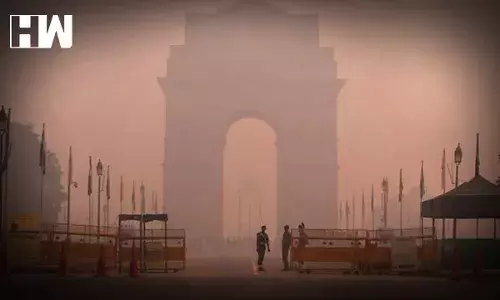New Delhi: According to a new study published in The Lancet Planetary Health journal, India had nearly 23.5 lakh premature deaths owing to pollution of all forms in 2019, the highest among all countries globally, including 16.7 lakh fatalities attributable by air pollution.
According to the researchers, ambient PM2.5 pollution — microscopic pollution particles in the air that are two and one half millimeters or less in width — was responsible for the bulk of air pollution-related deaths in India (9.8 lakh).
According to them, another 6.1 lakh deaths were caused by residential air pollution.
Pollution of any form killed nine million people globally in 2019, accounting for one in every six fatalities.
Air pollution, including indoor and outdoor, was the leading cause of death, accounting for 6.67 million fatalities worldwide.
“The health impacts of pollution remain enormous, and low- and middle-income countries bear the brunt of this burden. Despite its enormous health, social and economic impacts, pollution prevention is largely overlooked in the international development agenda,” said study lead author Richard Fuller, from Global Alliance on Health and Pollution, Geneva, Switzerland.
“Attention and funding has only minimally increased since 2015, despite well-documented increases in public concern about pollution and its health effects,” Fuller said in a statement.
The Indo-Gangetic Plain (northern India) has the most severe air pollution, according to the researchers, since terrain and meteorological concentrate pollutants from energy, mobility, industry, agriculture, and other activities.
According to the study, burning of biomass in households was the single largest cause of air pollution deaths in India, followed by coal combustion and crop burning.
Population-weighted mean exposure to ambient air pollution peaked nationally in India at 95 milligrammes per cubic metre (mg/m3) in 2014, was reduced to 82mg/m3 by 2017, but more recently has been rising slowly again, the researchers said.
“India has developed a range of instruments for tackling air pollution, including a National Clean Air Program, and in 2019 launched a Commission for Air Quality Management in the National Capital Region. State Pollution Control Boards have regulatory powers to impose and enforce emissions standards on pollution sources,” the authors of the study noted.
“However, India does not have a strong centralised administrative system to drive its air pollution control efforts and consequently improvements in overall air quality have been limited and uneven,” they said.
According to the survey, India’s PM2.5 pollution levels are still significantly above WHO recommendations of 10 micrograms per cubic metre in 93 percent of the country.
Economic losses due to modern forms of pollution – ambient particulate matter air pollution, ozone pollution, lead exposure, occupational carcinogens, gases, fumes – have increased between 2000 and 2019 in India and are now approximately 1 per cent of its gross domestic product (GDP), it said.
The new report is an update to The Lancet Commission on Pollution and Health.
It states that although the number of deaths from pollution sources associated with extreme poverty – such as indoor air pollution and water pollution – have decreased, these reductions are offset by increased deaths attributable to industrial pollution such as ambient air pollution and chemical pollution.
The new report provides updated estimates for the health effects of pollution based on the most recently available 2019 GBD data and methodological updates, as well as an assessment of trends since 2000.
The researchers said water pollution was responsible for 1.36 million premature deaths globally. Lead contributed 900,000 premature deaths, followed by toxic occupational hazards at 870,000 deaths.
As an independent media platform, we do not take advertisements from governments and corporate houses. It is you, our readers, who have supported us on our journey to do honest and unbiased journalism. Please contribute, so that we can continue to do the same in future.

